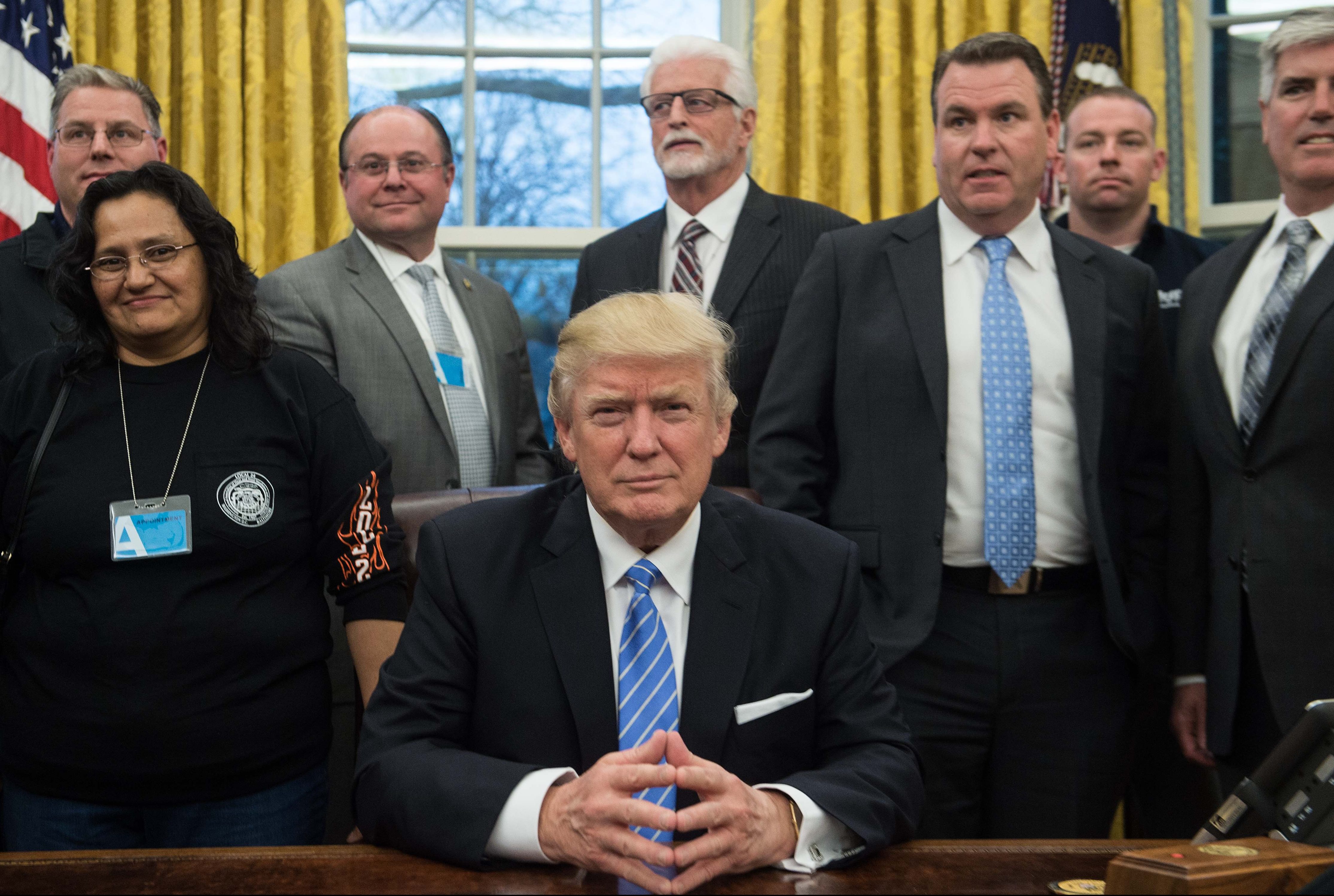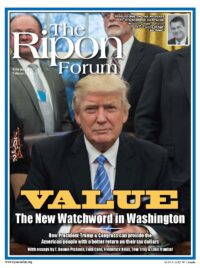
If there’s been one mantra for Republicans over the past 30 years, it can be found in the famous passage from Ronald Reagan’s First Inaugural Address when he stated that, “Government is not the solution to our problem; government is the problem.”
After hearing Donald Trump’s Inaugural Address, many Republicans expressed concern that our new President has forgotten this mantra. After all, from rebuilding our infrastructure to negotiating the prices that drug companies charge, Trump is calling for government to play a more active role in solving the problems that people face.
In response, some in the GOP say they are ready to stand up for the principles on which the party was built. “There are some of us who will be pushing to get back to the roots of the party,” Senator Jeff Flake said in an interview with the New York Times. “Limited government, economic freedom, individual responsibility, free trade. Those are things that the party has stood on for a long time.”
Senator Flake is one of the leading voices for common sense conservatism in America, and he is right — the GOP was built on the principle that federal power should be limited. But it is also worth remembering that when Donald Trump calls for a government that is more effective, he is not repudiating Ronald Reagan. He is echoing him. Specifically, he is echoing another passage from Reagan’s First Inaugural Address that is all too often forgotten today. “It’s not my intention to do away with government,” the Great Communicator stated. “It is rather to make it work.”
The simple reality is that Americans want value for their tax dollars. If they are going to be asked to send their money to Washington, they want to know they are getting something in return.
Making government work. The concept itself has become laughable in recent years. From Hurricane Katrina in 2005 to the Great Recession of 2008 to the VA scandal of 2014 to the rise of ISIS today, the federal government has repeatedly been unable to ward off threats and deal with problems effectively after they arise. As a result, poll after poll shows that trust in government is at or near an all-time low. Despite this mistrust, these same polls also reveal that people want government to work.
And yet when Americans look at Washington, they see two political parties that have become ideologically blinded in this regard. The perception is that Democrats just want to throw money at a problem and make government bigger, while Republicans just want to cut your taxes and think government makes everything worse. The simple reality is that Americans want value for their tax dollars. If they are going to be asked to send their money to Washington, they want to know they are getting something in return.
This desire cuts across all income groups. The man who makes minimum wage and puts $10 into his tank on his way to work wants to know that the 18.4 cents per gallon he is paying in federal gas taxes are being well spent. When he drives home at night over a bridge that is falling apart, he knows that they are not. Similarly, a woman who earns a comfortable salary and pays over $300,000 in Social Security taxes over the course of her career wants to know the program will be there when she retires. When she reads that Social Security is going broke, she wonders if that will be the case.
The public desire to have a government that works is also reflected in a recent poll the Ripon Society conducted of the American electorate. This survey, which was conducted the second week in January by veteran GOP strategist Ed Goeas, found that 66 percent of voters think the federal government is not doing enough to solve problems. “Don’t take this to mean that people want more government or bigger government,” Goeas stated. “They want effective government.”
The survey provides some insight into how Congress and the new President can achieve that goal. When asked if “Federal government programs should be subjected to regular performance reviews to ensure they are providing Americans with value for their tax dollars,” 94 percent of Americans – and 95 percent of Trump voters – said that they should. It is worth noting that the Ripon survey asked voters about many proposals – from reforming taxes to repealing Obamacare. By far, though, the idea of subjecting government programs to performance reviews was the most popular proposal of all.
When asked if “Federal government programs should be subjected to regular performance reviews to ensure they are providing Americans with value for their tax dollars,” 94 percent of Americans – and 95 percent of Trump voters – said that they should.
Other proposals geared around limiting federal power and making the bureaucracy more accountable also proved popular. For example, when asked if federal regulations should have a sunset date “where they either end or Congress decides to renew them,” 79 percent of Americans – and 88 percent of Trump voters – said that they should. Along similar lines, when asked if they believed that “federal workers should be rewarded if they are doing a good job” and more easily fired “if they are doing a bad job,” 85 percent of Americans – and 89 percent of Trump voters — said that they believed that they should.
To conclude with an analogy, taxpayers are no different than any other kind of consumer in that they want to know they’re getting their money’s worth. That’s why consumers shop at Target, because they know, as the company promises, that they can “Expect More, Pay Less.” When it comes to the federal government, taxpayers believe that just the opposite is true. To make matters worse, taxpayers also believe that Republicans and Democrats in Washington don’t care. They are like two sales clerks who are so busy fighting in the aisle that they ignore what’s on the shelf.
Donald Trump was elected to change all that — to rise above the partisan bickering and do what works. The challenge for our new President is to not let his ego and other obsessions get in the way. For just as any consumer would walk out of the store if they saw two clerks fighting in the aisle, they will do the same if they see that the store manager has let power go to his head.
About a month after the election, Gerald Seib of the Wall Street Journal wrote that Donald Trump is America’s first post-ideological President. Others have made similar observations, and they are right. The Americans who voted for Trump did not elect him because they thought he would conform to some political orthodoxy. They elected him because they thought he could make government work.
Value is the new watchword in Washington. Which is why the ultimate test for the President and Congress will not be their allegiance to an old Republican mantra. It will be their ability to convince Americans that their tax dollars are finally being put to good use.
Lou Zickar is Editor of The Ripon Forum.




